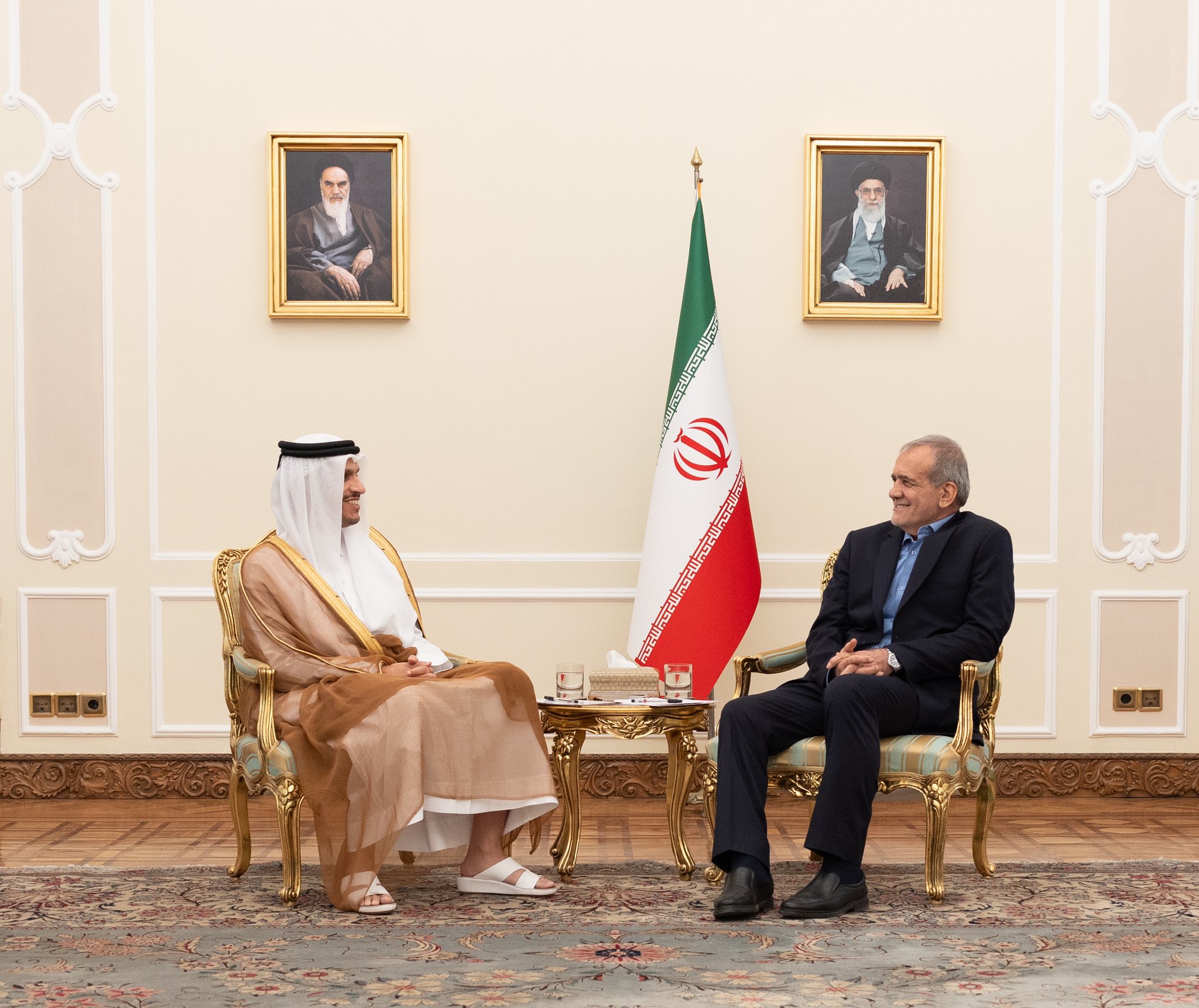Iran’s Foreign Minister said his country’s response to the “Israeli terrorist attack in Tehran is definitive, and will be measured and well calculated.”
Qatar’s Prime Minister, Sheikh Mohammed bin Abdulrahman Al-Thani and Iran’s President Masoud Pezeshkian have discussed developments in the region and ways to maintain its security and stability during a meeting in Tehran on Monday.
The meeting took place as part of a visit by Sheikh Mohammed, who is also Qatar’s foreign minister, to Iran’s capital city. In a statement, Doha’s foreign ministry said Sheikh Mohammed conveyed the greetings of Qatar’s Amir Sheikh Tamim bin Hamad Al-Thani to Pezeshkian.
The Islamic Republic News Agency (IRNA) separately reported that Pezeshkian and Sheikh Mohammed expressed their readiness to boost Doha and Tehran’s bilateral cooperation “in all areas.”
During his visit to Tehran, Qatar’s prime minister also met Iran’s newly-appointed Foreign Minister Abbas Araghchi.
According to Qatar’s foreign ministry, the discussions focused on regional tensions, the developments in the Gaza Strip and occupied Palestinian territories, and the latest in mediation efforts that are aimed at reaching a ceasefire in the besieged enclave.
Sheikh Mohammed and Araghchi also stressed the importance of ending the war in the Strip and Israel’s crimes against Palestinians.
The two top officials underscored the need to stop “the terrorism practiced by settlers in the West Bank in order to spare the region the dangers of escalation.”
The region has witnessed mounting tensions since the beginning of Israel’s brutal onslaught in the Gaza Strip on October 7, 2023, where it has killed at least 40,435 people.
Fears over further escalations in the Middle East emerged after Israel assassinated Hamas political chief Ismail Haniyeh in Tehran on July 31, hours after assassinating Hezbollah’s top commander Fouad Shukur in Beirut on July 30.
Haniyeh was in Tehran at the time for the inauguration of Pezeshkian, who was elected last month after his predecessor, Ebrahim Raisi, died in a helicopter crash in May.
While Israel claimed the killing of Shukur, it has yet to claim responsibility for the killing of Haniyeh. Qatar had condemned the killing of Haniyeh at the time while questioning Israel’s move, which came at a critical time for the negotiations.
Iran has since vowed to retaliate against Israel for the killing of Haniyeh on its soil as Hezbollah began its retaliation for the killing of Shukur at dawn on Sunday.
In a televised address hours after the retaliatory attack, Hezbollah Secretary-General Hassan Nasrallah confirmed that the group fired 340 rockets towards Israel, including the Galilot base, home to Mossad, Israel’s intelligence service.
Nasrallah noted that the retaliation was delayed for several reasons, including the Gaza ceasefire talks.
“Our goal[…]is to end the aggression on Gaza, so we gave it enough of an opportunity, but after all this time, it is clear that Netanyahu is putting in new conditions and the Americans are working with him and this is all a waste of time, so there was no reason to delay any longer,” Nasrallah said.
Meanwhile, on Monday, Iran’s foreign minister said his country’s response to the “Israeli terrorist attack in Tehran is definitive, and will be measured and well calculated.”
“We do not fear escalation, yet do not seek it—unlike Israel,” Araghchi said on X, following a phone call with his Italian counterpart Antonio Tajani.
Araghchi also held phone calls with his counterparts in Saudi Arabia, Egypt and Türkiye between Saturday and Sunday.
“Iran’s message is clear: Our neighbours are our priority. We are determined to move towards a strong region. Path to unity goes through dialogue, cooperation, synergy and empathy,” he said in a post on X following the calls.







